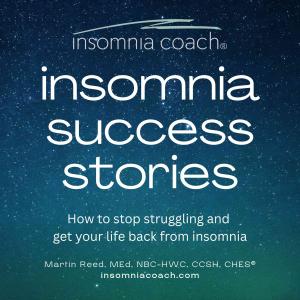Insomnia Coach® Podcast

How Gretchen went from believing she was the world's worst sleeper to someone who sleeps well and has confidence in her own natural ability to sleep (#16)
Listen to the podcast episode (audio only) Gretchen is a pediatrician and the mother of three children. Her sleep was regularly disrupted as she worked shifts during college and was on call during her pediatric residency. After having children and then entering early menopause, Gretchen started to spend hours awake during the night. This led to sleep-related worry and anxiety that combined with work stress to make sleep more frustrating and more difficult. In this episode, Gretchen talks about how changing the way she thinks about sleep and implementing constructive sleep-related behaviors helped her improve her sleep significantly — and how setbacks along the way didn't lead to insomnia working its way back into her life. Gretchen went from believing she was the world's worst sleeper to looking forward to going to bed at night! Gretchen did it — and you can, too! Click here for a full transcript of this episode.Click here to hide the transcript. Martin Reed: Welcome to the Insomnia Coach Podcast. My name is Martin Reed. I believe that nobody needs to live with chronic insomnia and that evidence-based cognitive and behavioral techniques can help you enjoy better sleep for the rest of your life. Martin Reed: The content of this podcast is provided for informational and educational purposes only. It is not medical advice and is not intended to diagnose, treat, cure, or prevent any disease, disorder, or medical condition. It should never replace any advice given to you by your physician or any other licensed healthcare provider. Insomnia Coach LLC offers coaching services only and does not provide therapy, counseling, medical advice, or medical treatment. The statements and opinions expressed by guests are their own and are not necessarily endorsed by Insomnia Coach LLC. All content is provided "as is" and without warranties, either express or implied. Martin Reed: Okay. So Gretchen, thank you so much for coming onto the podcast today. Gretchen Volk: Oh my pleasure. Thanks for having me. Martin Reed: So can we start right from the beginning and can you just tell us when your sleep issues began and in what ways were you struggling with sleep? Gretchen Volk: So, I struggled with sleep for many, many years. Things got noticeably worse probably seven years ago when I entered early menopause. So for the past seven years I've just been struggling more nights than not. Martin Reed: Mm-hmm (affirmative). So, did you tend to struggle with falling asleep at the start of the night or was it more to do with waking and then finding it hard to fall back to sleep or maybe both? Gretchen Volk: Yeah, for me it was both, so it would take me a long time to fall asleep, and then I would pop up multiple times during the night and just stay awake thinking in my brain way too hard and wishing I could go back to sleep. Martin Reed: I think you touched upon it there, but why do you think you were struggling with sleep, what do you think was the barrier that was making sleep more difficult for you? Gretchen Volk: I think ultimately the issue was the anxiety that I developed around sleep. So I think initially there were maybe some hormonal issues that switched in my body and then issues just related to family conflict and worries about that and work stress, all the normal things. But then, I think why this became such a huge problem for me is that at the slightest sign of sleep trouble, my brain would just launch into this full fledged attack like, this is going to be terrible. Oh my gosh, here goes another bad night. Oh, you've only got six hours left to get a good sleep. You better fall asleep right now,






 Visit Podcast Website
Visit Podcast Website RSS Podcast Feed
RSS Podcast Feed Subscribe
Subscribe
 Add to MyCast
Add to MyCast